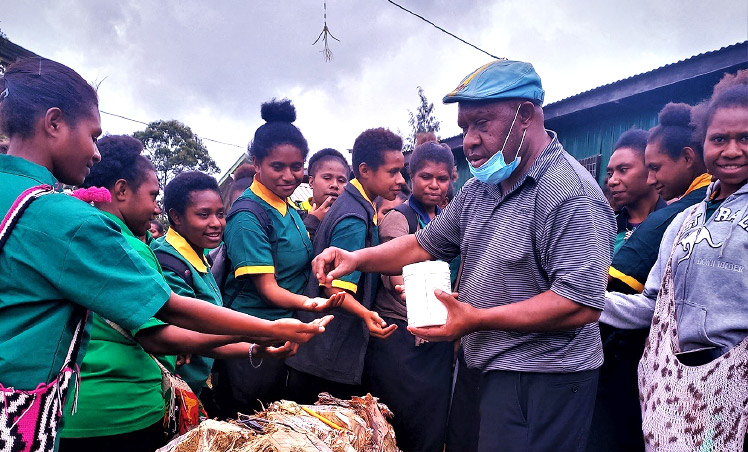Iodine Global Network (IGN)
Sprunglinks/Accesskeys
Zur Startseite (Accesskey 0) Direkt zur Hauptnavigation (Accesskey 1) Direkt zum Inhalt (Accesskey 2) Kontakt (Accesskey 3) Sitemap (Accesskey 4) Suche (Accesskey 5)
DONATE

The Iodine Blog - July 2022

The Iodine Blog - July 2022

Spreading the word about iodine nutrition and distributing iodine capsules in remote areas of Papua New Guinea.
Without iodized salt, the solution is not simple
Salt is an ideal vehicle for fortification because it’s almost universally consumed. But it doesn’t reach everyone, and so the more severe effects of iodine deficiency, such as cretinism, are still being experienced in some of the remotest corners of the world.Our primary mission at IGN is to make sure iodized salt reaches everyone, forever. But where that isn’t happening, sometimes, a combination of interventions is needed. This was the case in Papua New Guinea, where IGN, UNICEF, the government and medical students from the University of Papua New Guinea, all came together to implement a mix of interventions, including the distribution of iodine oil capsules in several provinces between 2020 and 2022. We thought we’d share what we learned from this experience.
Importation and sale of non-iodized salt is banned in Papua New Guinea, and it is mandatory that all salt must be iodized. However, there is no systemic monitoring of the iodine nutrition status of communities in high-altitude, hard to reach areas without road access. Surveys in parts of Gulf, Simbu and Morobe provinces showed iodine deficiency was still a problem and found high prevalence of iodine deficiency among school-age children in two districts of Simbu province, as well as children with severe physical and intellectual impairment.
IGN’s Board Chair, Dr. Michael Zimmermann and National Coordinator Victor Temple wanted to find a solution, and began talking to government and partners working in the country. In 2020, with the support of UNICEF and IGN, students from the Simbu Medical Student Association (SMSA) joined community health workers in distributing iodine capsules to children and women of childbearing age in one of the Simbu districts with high deficiency, reaching over 15,000 people and raising awareness about the use of iodized salt as they did so. The capsule distribution was accompanied by other health interventions, including vitamin A supplementation and deworming tablets. The work was difficult, sometimes involving walks of 4 hours to villages with no road access and difficult terrain. The students also took advantage of the opportunity of visiting these remote villages to conduct a survey on availability of salt and awareness of the importance of iodized salt, which will support future efforts to reach remote populations.
Similar efforts took place in other remote provinces, reaching a total of 35,000 people in 2020. Then, after a gap due to the COVID-19 pandemic, in February 2022 the government and partners began distribution again, this time in a further two districts in Simbu province, together with another rapid salt survey and testing of school children for deficiency. However, due to conflicting views about COVID-19 vaccination, less than 5% of the target population came to take the iodine capsules or the other interventions such as vitamin A supplementation and deworming medication.
The bundling of the interventions and the use of the opportunity to conduct surveys and assess children’s iodine status meant that the efforts in Papua New Guinea not only reached some 45,000 people in total but were as cost-effective as possible. But it reinforces our belief that getting iodized salt into households in every corner of the world, and make sure it remains iodized, is the best way forward.